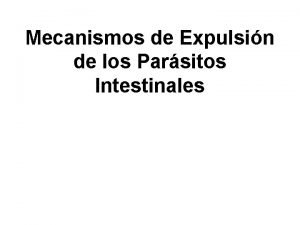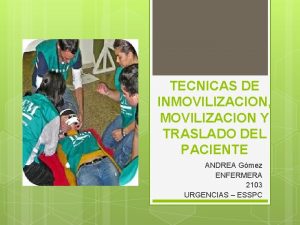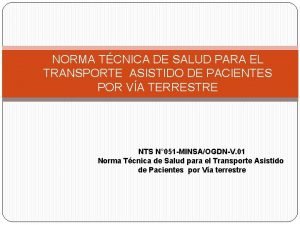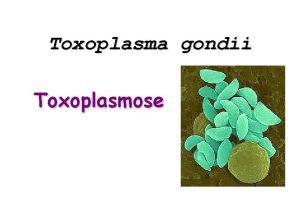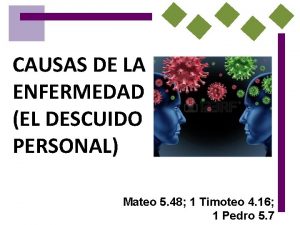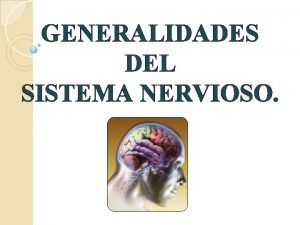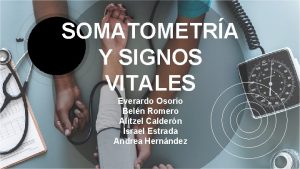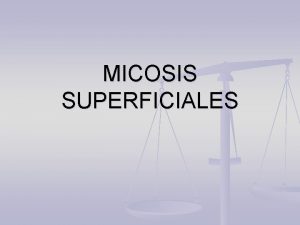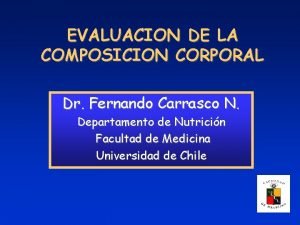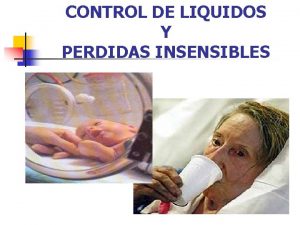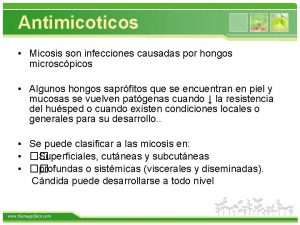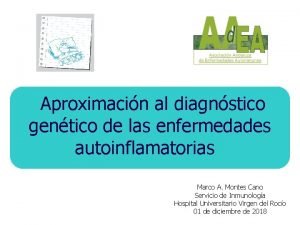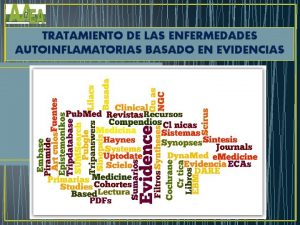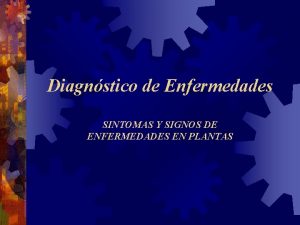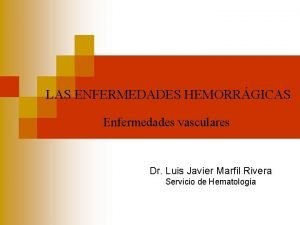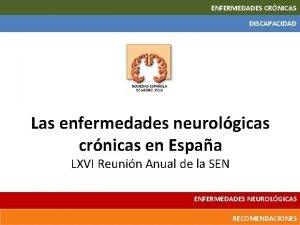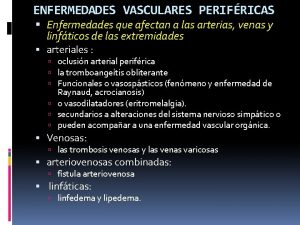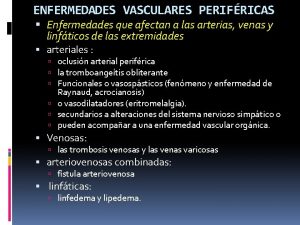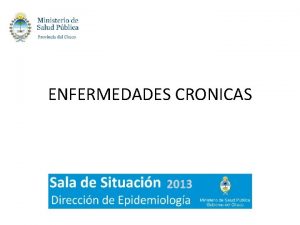Diagnstico de las enfermedades autoinflamatorias en pacientes adultos
































- Slides: 32

Diagnóstico de las enfermedades autoinflamatorias en pacientes adultos José Hernández-Rodríguez Unidad Clínica de Enfermedades Autoinflamatorias. Unidad de Vasculitis Servicio de Enfermedades Autoinmunes. Hospital Clínic de Barcelona IDIBAPS. Universitat de Barcelona

What to know for diagnosing autoinflammatory diseases in adults • Definition and history • Spectrum between autoimmunity and autoinflammation • Spectrum of autoinflammatory diseases: different types • Genetic particularities: interpretation of genetic variants • Monogenic autoinflammatory diseases • Identification of diseases (more and less common) • Diagnostic process in children and adult patients • Clinical and genetic differences between children and adults • Autoinflammatory diseases in adults: the real life

Autoinflammatory diseases Definition Autoinflammatory diseases are defined as illnesses caused by primary dysfunction of the innate immune system This new concept includes a broad number of diseases, initially focusing on Hereditary recurrent fevers such as the prototype FMF, Familial Mediterranean Fever Until recently, these conditions were defined only by phenotypic features, including recurrent attacks of fever, abdominal pain, arthritis or cutaneous signs, which sometimes overlap and may obscure accurate diagnosis. However, this disease classification has expanded due to the recent advances in our understanding of disease pathogenesis with the discovery of the molecular basis of these disorders. Additional disorders which are now regarded as autoinflammatory diseases include hereditary disorders such as Blau disease and complex disorders such as Crohn's or Behçet's disease.

Autoinflammatory diseases Definition 2002

Spectrum of Autoimmune / Autoinflammatory diseases ren d l i h gc n i t c ffe a y l t Mos Innate immune system Proinflammatory cytokines Neutrophils/macrophages Fever / Tisssue damage Adaptive immune system Loss of self-tolerance T and B cell activation Autoantibodies Tisssue damage ults d a ting c e f f ly a t s o M

The expanding spectrum of Autoinflammatory Diseases Typical clinical picture Clearly pathogenic mutations (germ-line or somatic) Monogenic AID Incomplete/atypical presentation Low-penetrance mutations or combination of different variants (i. e. R 92 Q in TNFR 1, Q 703 K in NLRP 3…) Undifferentiated AID Atypical/overlap manifestations Negative genetic tests Response to specific treatments Unknown/new monogenic disorders Polygenic/ Multifactorial AID Still, Behçet’s, Crohn’s, Gout, PFAPA, So. JIA, …

Autoinflammatory diseases Interpretation of genetic results • Pathogenic or disease-causing mutations • Low- or incomplete-penetrance variants (uncertain clinical significance) • Benign variants or polymorphisms

Most common monogenic autoinflammatory diseases in our area FMF Familiar Mediterranean fever TRAPS Tumour necrosis factor (TNF)-receptor associated periodic syndrome CAPS Cryopyrin associated periodic syndrome FCAS Familial cold induced autoinflammatory syndrome MWS Muckle Wells syndrome CINCA/NOMID Neonatal multisystemic disease (neurologic, cutaneous, articular) MKD Mevalonate kinase deficiency HIDS Hyper-Ig. D syndrome and periodic fever ** PFAPA Periodic fever, aphtous stomatitis, pharingitis and cervical adenitis Tamir N et al. Am J Med Genet 1999 Marek-Yagel D et al. Arthritis Rheum 2009 Ravet N et al. Ann Rheum Dis 2006 Cantarini L et al. Semin Arthritis Rheum 2014 Cantarini L et al. Clin Exp Rheumatol 2012 Hernández-Rodríguez J et al. Autoimmun. Rev 2016

Monogenic autoinflammatory diseases with possible onset in adults Prevalence FMF Familiar Mediterranean fever 1 -5/10. 000 TRAPS Tumour necrosis factor (TNF)-receptor associated periodic syndrome 1 -9/1. 000 CAPS Cryopyrin associated periodic syndrome 1 -3/1. 000 FCAS Familial cold induced autoinflammatory syndrome MWS Muckle Wells syndrome HIDS Hyper-Ig. D syndrome and periodic fever NLRP 12 -AD NLRP 12 associated disease (FCAS-2) MAS-NLRC 4 Macrophage activation syndrome associated to NLRC 4 (FCAS-4) DITRA Deficiency of interkeukin-36 receptor antagonist <1/1. 000 Pediatric granulomatous arthritis Blau syndrome and early onset sarcoidosis or DADA 2 Deficiency of ADA 2 ? ? ? SAVI STING-associated vasculopathy with onset in infancy ** PFAPA Periodic fever, aphtous stomatitis, pharingitis and cervical adenitis

Study of autoinflammatory diseases in a reference center for adults 2008 -2014

Autoinflammatory diseases in adults: diagnostic process Flow chart & Results 19% Hernández-Rodríguez J et al. Autoimmun Rev 2016

Results Autoinflammatory diseases in adults: diagnostic process 73 (81%) patients with a negative genetic result… Alternative diagnoses (n=58; 64%) • • Autoimmune diseases (mainly Lupus-like): 21 (32%) patients Inflammatory bowel disease (any type): 4 (6%) Hypocomplementemic vasculitis, cancer and infections in 2 (3%) each Other non-conclusive diagnoses • Long-lasting / recurrent episodes of abdominal pain/pleuropericarditis: 6 • Ocular/optic nerve involvement: 3 • Angioedema: 3 • Inflammatory lymphadenopathy: 2 • Recurrent lymphocytic meningitis: 2 • Polygenic/multifactorial diseases (n=13; 15%) • PFAPA: 5 (8%) • Adult-onset Still disease: 5 (8%) • Behçet’s disease: 3 (5%) Probable undifferentiated autoinflammatory diseases (n=10; n=10 12%) negative genetic results but suggestive or atypical clinical manifestations with good response to conventional or biological drugs for autoinflammatory diseases Hernández-Rodríguez J et al. Autoimmun Rev 2016

Results Autoinflammatory diseases in adults: diagnostic process 32 patients with AID • FMF 12 (37. 5%) • CAPS 8 (25%) (3 MWS / 5 overlap FCAS/MWS, 1 overlap FCAS/HIDS) – No CINCA patients • TRAPS 6 (18. 8%) (2 overlap with FMF) • HIDS 1 (3%) (+ 1 overlap FCAS/HIDS) • PFAPA 5 (16%) Hernández-Rodríguez J et al. Autoimmun Rev 2016

Autoinflammatory diseases in adults: diagnostic process Clinical features Disease-onset: during childhood in 15 (47%) patients during adulthood in 17 (53%) patients Disease diagnosis ≥ 16 yrs. Mean Range Symptoms onset: 21 yrs ( 1 -68 yrs) Diagnosis: 32 yrs (16 -68 yrs) Diagnostic delay: 12 yrs ( 4 -47 yrs)

Autoinflammatory diseases in adults: diagnostic process Response to treatment / Outcomes 17 (53%) 12 (38%) (amyloidosis)

Autoinflammatory diseases in adults Genetic results FMF TRAPS CAPS MKD MEFV TNFRSF 1 A NLRP 3 MVK p. M 694 I/WT (2) p. K 695 R/WT p. E 148 Q/WT p. R 92 Q/WT (5) p. V 198 M/WT (3) p. A 439 V/WT (3) p. H 49 R/WT (1) p. V 80 I/WT p. M 694 I/p. V 726 A p. M 694 V/p. E 148 Q p. M 694 I/p. R 202 Q p. I 640 M/p. R 653 H p. M 582 L/p. R 202 Q p. A 744 S/p. R 202 Q p. I 591 T/p. R 202 Q p. V 690 L/E 467 E p. P 46 L/WT (1) p. R 135 H/WT (1*) +p. V 377 I/WT * same patient

Autoinflammatory diseases in adults Genetic results FMF TRAPS CAPS MKD MEFV TNFRSF 1 A NLRP 3 MVK p. M 694 I/WT (2) p. K 695 R/WT p. E 148 Q/WT p. R 92 Q/WT (5) p. V 198 M/WT (3) p. A 439 V/WT (3) p. H 49 R/WT (1) p. V 80 I/WT p. M 694 I/p. V 726 A p. M 694 V/p. E 148 Q p. M 694 I/p. R 202 Q p. I 640 M/p. R 653 H p. M 582 L/p. R 202 Q p. A 744 S/p. R 202 Q p. I 591 T/p. R 202 Q p. V 690 L/E 467 E p. P 46 L/WT (1) p. R 135 H/WT (1*) +p. V 377 I/WT * same patient 50% 100% 75% 50% 73% Genetic variants of uncertain clinical significance Low-penetrance mutations Novel mutations Polymorphysms 100% Heterozygous (simple or compounds)

Autoinflammatory diseases in adults Genetic results TRAPS TNFRSF 1 A p. R 92 Q/WT (5) p. P 46 L/WT (1) Almost all “TRAPS” with onset in the adulthood were caused by the R 92 Q variant… … in our series

Autoinflammatory diseases in adults TRAPS Eurofever/EUROTRAPS International Registry Pediatric onset Adult onset Total Variants Cysteine residue /T 50 M mutations 50 (41%) 8 (23%) 58 (37%) Other variants 31 (25%) 10 (28%) 41 (26%) R 92 Q / P 46 L variants 42 (34%) 17 (49%) 59 (37%) Total patients 123 (78%) 35 (22%) 158 (100%) Lachmann HL et al. Ann Rheum Dis 2014 Our TRAPS (R 92 Q) extended series 18 patients 7 patients with adult-onset 11 patients with pediatric onset 4 diagnosed during adulthood Ruiz-Ortiz E et al. Frontiers Immunol 2017

Autoinflammatory diseases in adults TRAPS – TREATMENT & OUTCOMES TRAPS (STRUCTURAL MUTATIONS) 100% on continuous treatment (glucocorticoids or biologics) TRAPS (R 92 Q-related disease) 28% asymptomatic and treatment-free 50% NSAIDs or glucocorticoids on-demand 22% biologic agents Pelagatti MA et al. Arthritis Rheum 2011 Cantarini L et al. Semin Arthritis Rheum 2014 Ruiz-Ortiz E et al. Frontiers Immunol 2017

Autoinflammatory Diseases in pediatric and adult patients • Pediatric age • More severe disease Disease-causing mutations Adulthood • Clinical onset in adult life • Clinical onset during childhood diagnostic in adulthood Diagnostic delay symptoms misinterpreted by physicians … mild / minimized by patients? ? Less severe / mild disease Low-penetrance mutations

FMF Adult onset Characteristics in adult onset compared to children onset FMF Clinical Lower frequency of abdominal pain, arthralgia, myalgia, pleuritis, skin lesions Genetic Higher frequency of simple heterozygous variants and heterozygous compounds by pathogenic mutations, low penetrance variants (E 148 Q) or polymorphisms (R 202 Q) Hernández-Rodríguez J et al. Med Clin (Barc) 2018

TRAPS Adult onset Characteristics in adult onset compared to children onset TRAPS Clinical Lower frequency of myalgia, painful rash, conjunctivitis, periorbital edema Genetic Higher frequency of low-penetrance variants (mostly R 92 Q) Hernández-Rodríguez J et al. Med Clin (Barc) 2018

CAPS Adult onset Characteristics in adult onset compared to children onset Clinical CAPS FCAS / MWS Lower frequency of urticarial rash, myalgia, arthralgia and neurosensory hearing loss Low-penetrance variants and polymorphisms (V 198 M, A 439 V, Q 703 K) in mild phenotypes (FCAS/MWS) Genetic ** Somatic mutations may be associated with adult onset (mild FCAS) and also with a severe phenotype of FCAS and MWS in adults (neurosensorial hearing loss and amyloidosis) … probably due to a diagnostic and treatment delay … Bujan-Rivas S et al. Clin Exp Rheumatol 2017 Rowczenio DM et al. Front Immunol 2017 Hernández-Rodríguez J et al. Med Clin (Barc) 2018

HIDS Adult onset Characteristics in adult onset compared to children onset HIDS Clinical Predominance of abdominal symptoms (abdominal pain, nausea and vomits) and maculopapular rash No oral aphthae or adenopathies Genetic Presence of c. 769. 38 C>T variant (considered as probably benign), in homozygous or heterozygous compounds Tas DA et al. Clin Rheumatol 2012 Hernández-Rodríguez J et al. Med Clin (Barc) 2018

PFAPA Adult onset Characteristics in adult onset compared to children onset Clinical Treatment PFAPA Incomplete clinical triad (oral aphthae, pharyngitis /tonsillitis and cervical adenitis) Lower frequency of oral aphthae Glucocorticoids (high dose – 1 -2 days) effective (similar to children) Poor response to tonsillectomy Cantarini L et al. Clin Exp Rheumatol 2012 Hernández-Rodríguez J et al. Med Clin (Barc) 2018

Less frequent autoinflammatory diseases in adults

Autoinflammatory diseases in adults: real life

Autoinflammatory diseases in adults Conclusiones I • Las enfermedades autoinflamatorias monogénicas generalmente afectan a los niños, pero también pueden tener un inicio en la edad adulta, y se presentan con un fenotipo algo diferente al que manifiestan los niños, con frecuencia atípico o incompleto • Algunos casos que debutan en la edad pediátrica pueden llegar a ser diagnosticadas durante la edad adulta, con un retraso diagnóstico considerable • Las enfermedades autoinflamatorias poligénicas o multifactoriales, y otras consideradas indiferenciadas, también pueden tener su inicio en la edad adulta

Autoinflammatory diseases in adults Conclusiones II • Las enfermedades autoinflamatorias poligénicas o multifactoriales son enfermedades sistémicas que también pueden compartir algún mecanismo de autoinmunidad • Las enfermedades autoinflamatorias indiferenciadas son aquellas que se presentan con manifestaciones inflamatorias, en las que el estudio de los genes conocidos es negativo y el tratamiento dirigido a bloquear mismas vías inflamatorias que funcionan en las enfermedades monogénicas es efectivo • Las enfermedades autoinflamatorias en pacientes adultos tienen un espectro de presentación muy amplio y con frecuencia atípico, y su proceso diagnóstico suele ser complejo

Acknowledgments: Autoinflammatory Diseases Clinical Unit Department of Autoimmune Diseases Dept. Internal Medicine Dept. Rheumatology Dept. Infectious Diseases Dept. Dermatology Dept. Ophthalmology … … other centers in Spain … Autoinflammatory Diseases Laboratory Department of Immunology

¡¡Gracias por su atención !!
 Gusanos en las heces en adultos
Gusanos en las heces en adultos Uso de imagens de pacientes em redes sociais
Uso de imagens de pacientes em redes sociais Una doctora pasa en promedio 20 minutos con sus pacientes
Una doctora pasa en promedio 20 minutos con sus pacientes Técnicas de inmovilización de pacientes
Técnicas de inmovilización de pacientes Ambulancia dimensiones
Ambulancia dimensiones Evaluacion tono muscular ashworth
Evaluacion tono muscular ashworth Autolimitante
Autolimitante Imc fisterra
Imc fisterra Obligaciones de los pacientes
Obligaciones de los pacientes Identificación inequívoca de pacientes
Identificación inequívoca de pacientes Todas las enfermedades de transmisión sexualidad
Todas las enfermedades de transmisión sexualidad Triangulo de las enfermedades
Triangulo de las enfermedades Descuido personal
Descuido personal Qué son las enfermedades respiratorias
Qué son las enfermedades respiratorias Material de fabricación del serrucho
Material de fabricación del serrucho Cavidad craneal
Cavidad craneal Qué son las enfermedades transmitidas por vectores
Qué son las enfermedades transmitidas por vectores Sindrome del emperador en adultos
Sindrome del emperador en adultos Pronome possessivo
Pronome possessivo Puntos anatomicos para tomar la presion arterial
Puntos anatomicos para tomar la presion arterial Ritual de iniciacion cristiana para adultos
Ritual de iniciacion cristiana para adultos Compartiendo experiencias personales
Compartiendo experiencias personales Universidad abierta para adultos mayores
Universidad abierta para adultos mayores Pitiriasis alba vs versicolor
Pitiriasis alba vs versicolor Segmento diluyente de la nefrona
Segmento diluyente de la nefrona Furosemida dosis adultos
Furosemida dosis adultos Impedanciometria
Impedanciometria Pseudohipocalcemia
Pseudohipocalcemia Perdida insensible de liquidos
Perdida insensible de liquidos Los cuatro signos vitales son
Los cuatro signos vitales son ácido undecilénico mecanismo de acción
ácido undecilénico mecanismo de acción Actividad de perdon
Actividad de perdon O
O
